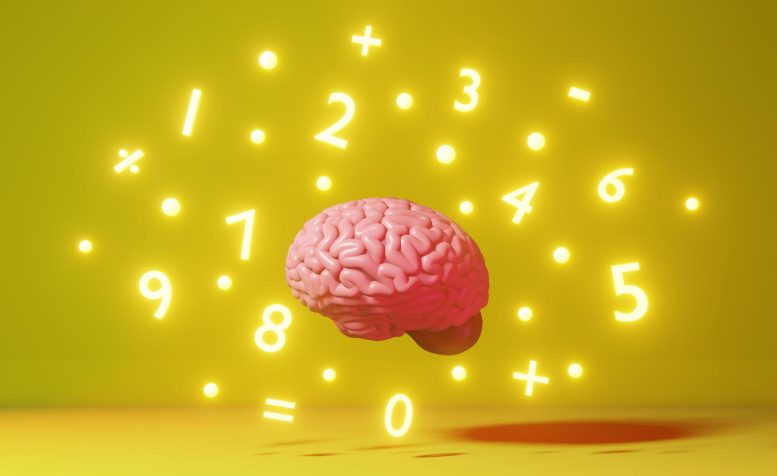
Electrical noise stimulation over the frontal brain improves math learning in individuals with low initial brain excitability, potentially offering a personalized neurostimulation approach to education.
Electrical noise stimulation targeted at a specific brain area can enhance math learning in individuals who find the subject challenging, reveals a recent study conducted by researchers from the Universities of Surrey and Oxford, Loughborough University, and Radboud University in The Netherlands.
The unique study explored the influence of neurostimulation on the learning process. Although there is an increasing interest in this non-invasive method, there is limited understanding of the induced neurophysiological alterations and their implications on learning.
Enhancing Math Performance in Low-Excitation Brains
Researchers found that electrical noise stimulation over the frontal part of the brain improved the mathematical ability of people whose brain was less excited (by mathematics) before the application of stimulation. No improvement in mathematical scores was identified in those who had a high level of brain excitation during the initial assessment or in the placebo groups. Researchers believe that electrical noise stimulation acts on the sodium channels in the brain, interfering with the cell membrane of the neurons, which increases cortical excitability.
Professor Roi Cohen Kadosh, Professor of Cognitive Neuroscience and Head of the School of Psychology at the University of Surrey who led this project, said: “Learning is key to everything we do in life – from developing new skills, such as driving a car, to learning how to code. Our brains are constantly absorbing and acquiring new knowledge.
“Previously, we have shown that a person’s ability to learn is associated with neuronal excitation in their brains. What we wanted to discover in this case is if our novel stimulation protocol could boost, in other words, excite, this activity and improve mathematical skills.”
For the study, 102 participants were recruited, and their mathematical skills were assessed through a series of multiplication problems. Participants were then split into four groups: a learning group exposed to high-frequency random electrical noise stimulation, and an overlearning group in which participants practiced the multiplication beyond the point of mastery with high-frequency random electrical noise stimulation. The remaining two groups consisted of a learning and overlearning group but they were exposed to a sham (i.e., placebo) condition, an experience akin to real stimulation without applying significant electrical currents. EEG recordings were taken at the beginning and at the end of the stimulation to measure brain activity.
Who Benefits Most from Electrical Noise Stimulation?
Dr. Nienke van Bueren from Radboud University, who led this work under Professor Cohen Kadosh’s supervision, said: “These findings highlight that individuals with lower brain excitability may be more receptive to noise stimulation, leading to enhanced learning outcomes, while those with high brain excitability might not experience the same benefits in their mathematical abilities.”
Professor Cohen Kadosh adds: “What we have found is how this promising neurostimulation works and under which conditions the stimulation protocol is most effective. This discovery could not only pave the way for a more tailored approach in a person’s learning journey but also shed light on the optimal timing and duration of its application.”
Reference: “Human neuronal excitation/inhibition balance explains and predicts neurostimulation induced learning benefits” by Nienke E. R. van Bueren, Sanne H. G. van der Ven, Shachar Hochman, Francesco Sella and Roi Cohen Kadosh, 31 August 2023, PLOS Biology.
DOI: 10.1371/journal.pbio.3002193
Never miss a breakthrough: Join the SciTechDaily newsletter.
1 Comment
What is the definition of Electrical noise? Frequencies?